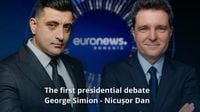In a tense and pivotal televised debate, Romanian presidential candidates Nicușor Dan and George Simion articulated starkly contrasting views on the nation's support for Ukraine, setting the stage for the upcoming elections that could reshape Romania's future and its role within the European Union. The debate, hosted by Euronews on May 8, 2025, comes just days before the second round of elections on May 18, where the stakes are high for both candidates and the nation.
George Simion, leader of the far-right Alliance for the Union of Romanians (AUR), who garnered 40.5% of the votes in the first round, expressed a controversial stance regarding EU funding, stating, "EU funds should not go to Ukraine, to anyone who is not a European citizen, to Romanians and the children of Romanians." This declaration resonated with a segment of the electorate that feels sidelined by the EU's broader policies.
Simion criticized the influx of foreign workers, claiming, "We see Indians, Pakistanis, Bangladeshis on the streets of Romania. Citizens from the third world are coming, and our citizens are leaving." His position on the war in Ukraine is one of neutrality, asserting that Romania should not escalate the conflict or supply arms, aligning his views with those of the Trump Administration. "My country is Romania; I will vote only according to the interests of the Romanian nation and not prioritize other states," he emphasized during the debate.
In contrast, Nicușor Dan, the mayor of Bucharest and an independent pro-European candidate, argued that the security of Romania and Moldova is intricately linked to the outcome of the war in Ukraine. "Russia is the aggressor; there needs to be a just peace that favors Ukraine; otherwise, we are paving the way for more regional tensions," Dan stated. He maintained that Romania's involvement in EU rearmament initiatives is crucial, but insisted that some funds must be allocated for Romania's economic development.
Both candidates condemned Putin's large-scale invasion of Ukraine, with Simion declaring that the Russian president "must be arrested for war crimes." However, Simion's views on the rights of ethnic Romanians in Ukraine, numbering around half a million, raised eyebrows. He insisted that Ukraine must respect their national rights and called for compensation for Romania's participation in the war effort.
Amidst the political tension, thousands of Romanians took to the streets on May 9, 2025, in a demonstration dubbed "One Path: Europe," advocating for Romania's European trajectory. The protest was critical of Simion, who is seen as a pro-Russian nationalist. The march, organized by civil society groups, aimed to reinforce Romania's commitment to the EU and NATO, especially in light of the rising influence of far-right sentiments.
Participants in the demonstration expressed grave concerns about the future direction of their country. Andreea Ghiocel, a 35-year-old protester, articulated the sentiment of many, stating, "It is a crucial moment for us and for our children." Another demonstrator, Iulia Rusneac, 38, expressed her opposition to Simion's Euro-skeptic positions, saying, "We have fought too hard to be in the EU to now consider leaving." The atmosphere was charged with slogans such as "Europe, that is where we belong" and "Better queues to vote than queues for passports," reflecting fears of potential emigration if Romania strays from European values.
The debate and protests come on the heels of a tumultuous electoral landscape in Romania. The Constitutional Court approved the first-round election results on May 9, confirming Simion's lead over Dan. The elections originally scheduled for late 2024 were annulled due to irregular campaign financing, which added to the urgency and intensity of the current political climate.
Approximately 91,000 Romanians residing in Moldova participated in the first round of voting, with 52% supporting Dan, while only 12% voted for Simion. This demographic's support for Dan underscores a potential shift towards pro-European sentiment among Romanians living abroad.
As the second round approaches, the candidates' differing views on national security and international alignment will be crucial in swaying undecided voters. Dan's pro-European stance and emphasis on security contrast sharply with Simion's isolationist approach. With nearly 90% of Romanians believing that the country should remain aligned with the West, the upcoming elections are not just a referendum on leadership but also on Romania's future direction within Europe.
In a final exchange during the debate, Dan challenged Simion on whether Romania would vote against EU support for Ukraine under his leadership, to which Simion responded, "I will prioritize the interests of Romania. The EU does not exist as an entity but as 27 states that comprise it. Our position must be in our national interest, not on our knees." This statement encapsulates the broader ideological divide that will shape Romania's political landscape in the coming days.
The outcome of the elections could have significant implications not only for Romania but also for Central and Eastern Europe, as the EU grapples with maintaining a unified stance on Ukraine amidst fluctuating support from member states. As voters prepare to head to the polls, the question remains: which path will Romania choose?




